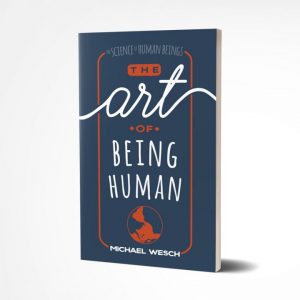Anthropology is the study of all humans in all times in all places. But it is so much more than that.
“Anthropology requires strength, valor, and courage,” Nancy Scheper-Hughes noted. “Pierre Bourdieu called anthropology a combat sport, an extreme sport as well as a tough and rigorous discipline. … It teaches students not to be afraid of getting one’s hands dirty, to get down in the dirt, and to commit yourself, body and mind. Susan Sontag called anthropology a “heroic” profession.”
What is the payoff for this heroic journey? You will find ideas that can carry you across rivers of doubt and over mountains of fear to find the the light and life of places forgotten. Real anthropology cannot be contained in a book. You have to go out and feel the world’s jagged edges, wipe its dust from your brow, and at times, leave your blood in its soil.

The Book
The textbook for this course is The Art of Being Human, available for free in pdf format, or if you prefer a bounded copy it is available for $16.99 on Amazon.
In the book I share many of my own adventures of being an anthropologist and what the science of human beings can tell us about the art of being human.
How this class works:
Anthropology is not just a body of facts. It is a way of seeing the world that can be valuable regardless of your career path. Mastering the anthropological perspective takes practice, so this class proceeds from a simple truth:
You can’t just think your way into a new way of living.
You have to live your way into a new way of thinking.
So each of the lessons is paired with a challenge that allows you to put the new ideas and perspectives into action, challenging you to talk to strangers, see the strange in the familiar, break your habits, see past your assumptions, see “dialectical relations,” get uncomfortable, understand people who are different from you, see how the world is connected, and ultimately to see yourself as a hero and write your manifesto.
Each lesson involves three steps:
- Read the lesson chapter and watch the lesson introduction video.
- Watch or listen to the recommended additional materials.
- Take the challenge and post your result.
Your instructor might have additional readings for you as well as required quizzes and discussions. Check your instructor’s official syllabus for details.
Course Overview: The 10 Lessons
The course is organized around 10 Big Ideas that you can learn by studying anthropology. Laid out in sequence they read almost like a manifesto:
- People are different. These differences represent the vast range of human potential and possibility. Our assumptions, beliefs, values, ideas, ideals – even our abilities – are largely a product of our culture.
- Wecan respond to such differences with hate or ignorance, or we can choose to open up to them and ask questions we have never considered before.
- When we open up to such questions, we put ourselves in touch with our higher nature. It was asking questions, making connections, and trying new things that brought us down from the trees, and took us to the moon.
- It is not easy to see our assumptions. Our most basic assumptions are embedded in the basic elements of our everyday lives (our language, our routines and habits, our technologies).
- We create our tools and then our tools create us.
- Most of what we take as “reality” is a cultural construction (“real”-ized through our unseen, unexamined assumptions of what is right, true, or possible.)
- We fail to examine our assumptions not just because they are hard to see, but also because they are safe and comfortable. They allow us to live with the flattering illusion that “I am the center of the universe, and what matters are my immediate needs and desires.”
- Our failure to move beyond such a view has led to the tragedy of our times: that we are more connected than ever, yet feel and act more disconnected.
- Memorizing these ideas is easy. Living them takes a lifetime of practice. Fortunately the heroes of all time have walked before us. They show us the path.
- They show us that collectively, we make the world. Understanding how we make the world – how it could be made or understood differently – is the road toward realizing our full human potential. It is the road to true freedom.